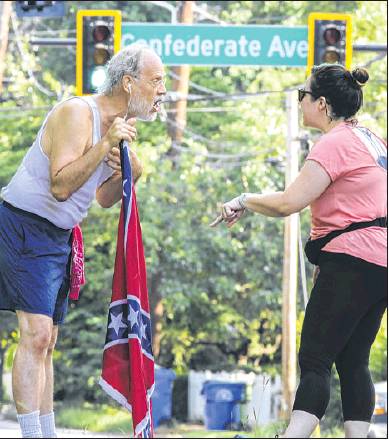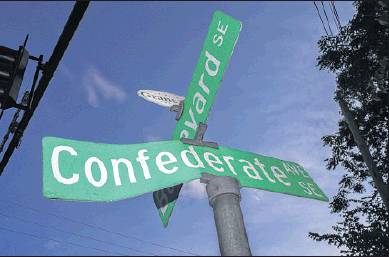CONFEDERATE SYMBOLS
Panel: Remove some Confederate street names in Atlanta
Reed announcement expected soon; plan faces some hurdles.
By Rosalind Bentley rbentley@ajc.com
Atlanta streets named for some of the Confederacy’s most recognizable generals and leaders will likely be renamed in the coming weeks, Mayor Kasim Reed is expected to announce as early as today.
What names might replace them is unclear, as are plans for other streets, monuments and markers named for rebels, according to a new report by a select committee studying the issue. The committee, appointed by Reed and the City Council earlier this year, was charged with devising a plan to address one of the most contentious issues facing cities and states today: what to do about Confederate iconography at a time of racial discord across the nation.
Atlanta’s committee of 11 appointees held public hearings through October to help decide the fate of dozens of streets and about a half dozen monuments and markers across the city. In a report given to Reed late last week, the committee recommended:
■ The immediate renaming of “Confederate Avenue, East Confederate Avenue, and any street named after Nathan Bedford Forrest, John B. Gordon, Robert E. Lee, Stephen Dill Lee or Howell Cobb. The aforementioned were significant Confederate military leaders and actively involved in white supremacist activities after the war, making them undeserving of the honor of a street name in Atlanta.”
■The city remove the Peace Monuments in Piedmont Park and at Peachtree Battle near Peachtree Road because they represent, “Lost Cause mythology” and ignore the experience of enslaved African-Americans. Both should be put in city storage.
■The Confederate Obelisk and Lion of the Confederacy monuments in Oakland Cemetery remain, but more context be added to the monuments. It also recommends no flags of the Confederacy be flown on the grounds.
■ A longer-term committee be formed at the city level to review whether to rename the dozen or more streets across the city also named for those with ties to the Confederacy.
“The committee was sensitive to the complexities of the situation,” said Douglas Blackmon, Pulitzer Prize-winning author and committee member. “Does any connection to the Confederacy become an immediate disqualifier? If this process continues, it will lead to some of the most complicated questions.”
In an interview with WABE late last week, Reed said he was inclined to implement the committee’s recommendations as soon as possible. But doing so will require clearing some hurdles. The city has a detailed ordinance for changing street names, which includes getting approval of 75 percent of property owners along the proposed street.
There is also a big obstacle with the state. In 2001, as part of a bargain to remove the 1956 state flag and its Confederate battle emblem, the Legislature was given all authority over Confederate monuments and statuary — even if they were owned by specific counties or cities. The compromise, however, didn’t include street names.
“I think that it’s certainly within the city’s purview to change the name of a street,” Reed said in the WABE interview. “We’re going to change the name of the street. If a member of the Legislature decides that they have a different opinion, that’s something that we’ll just have to have a conversation about.”
The mayor suggested in the interview that if the Legislature tries to block any of the city’s decisions, the city might mount a court challenge. But Reed only has a few weeks left in office. The new mayor could take a different path and could possibly leave the names and monuments as they are, which may be one of the reasons Reed is trying to act quickly.
Even in such a highly charged environment, Blackmon said, the committee thought it was important not to lose nuance in the debate. Some of the city’s neighborhoods with large African-American communities have high concentrations of Confederate street names, such as in the West End, Blackmon said. And there are whole neighborhoods named for former Confederate leaders, but the personal histories of those men complicate the matter of renaming. For example, Grant Park. The popular neighborhood is named for Lemuel P. Grant, an engineer who built the fortifications around Atlanta during the Civil War and who later donated land that became Grant Park. Blackmon said that after the war Grant “became a more equitable person than one might expect. He gave money to black churches,” and other causes.
On the other side of town is Adair Park, name for George Adair, a noted slave dealer before the war. Blackmon said Adair was an associate of Nathan Bedford Forrest, a slaver who went on to found the Ku Klux Klan.
“They almost certainly did business together,” Blackmon said. “Adair became one of Atlanta’s most wealthy citizens. That fortune all began dealing in human beings.”
So should both neighborhoods get a name change? Those are the kinds of questions a new mayor/council-appointed committee might answer. It is also unclear who has ownership of some monuments across the city, including the Obelisk at Oakland Cemetery, the report says. In the case of the Obelisk and the Lion, the report recommends that clear title be given the Historic Oakland Foundation.
The current committee was formed after a series of racially charged killings and incidents that began with the massacre of nine African-American worshippers in Charleston, S.C., by a white supremacist who draped himself with the Confederate battle flag. Then earlier this year, Heather Heyer was killed while protesting against white nationalists and supremacists in Charlottesville, Va.
When he called for the committee, Reed cited Hey-er’s death as a catalyst for re-examining Confederate iconography in Atlanta. Cities across the South from New Orleans to Baltimore are tackling the volatile issue of what to do with the divisive monuments. The city’s urban design commission has contacted some of those cities, and even universities in the North such as Yale, to examine how they dealt with the removal of monuments and the attendant debate.
While the committee did not recommend new names for the streets it identified as especially problematic, it did say that underrepresented Atlantans should be considered for the honor. It did, however suggest specific historical figures who might replace the peace monuments. But those names are sure to stoke even more debate because they are African-American men: Booker T. Washington and W.E.B. DuBois.
Staff writer Jim Galloway contributed to this report

